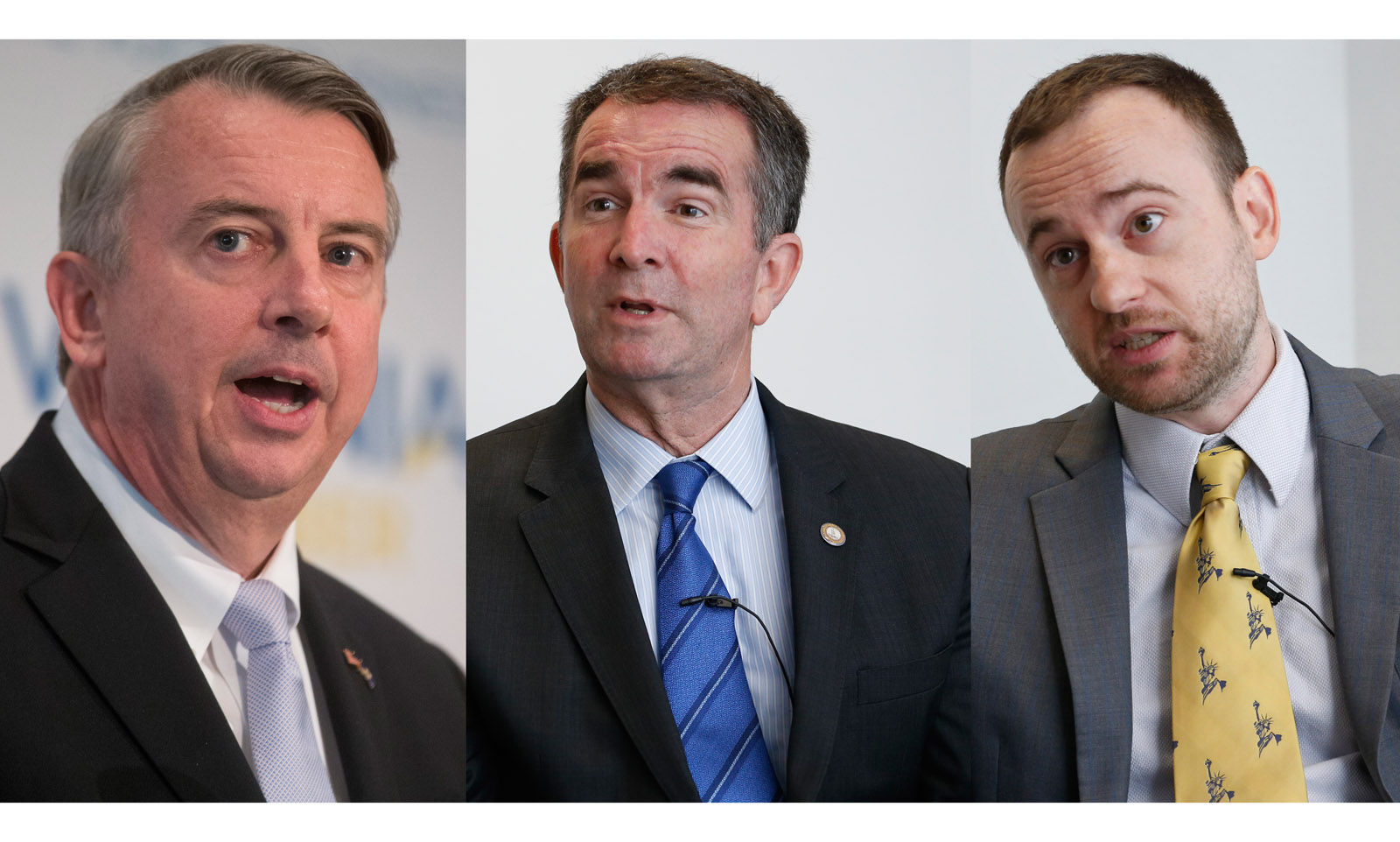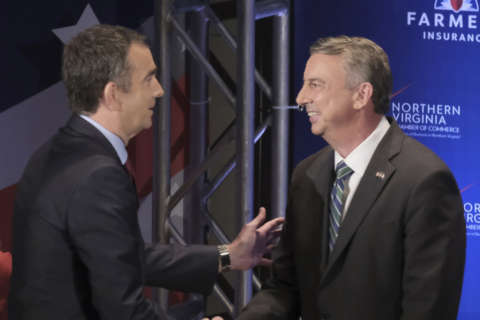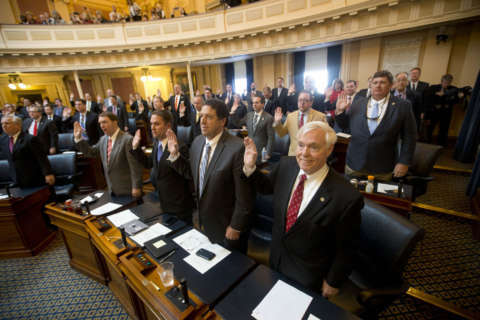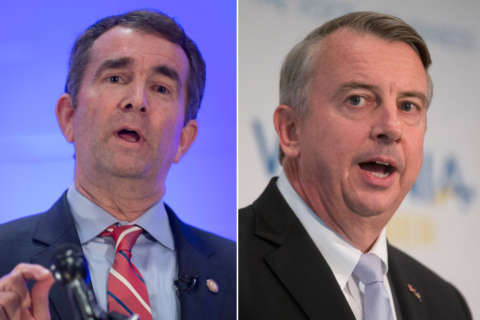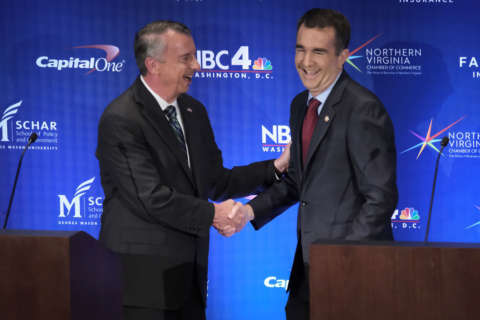WASHINGTON — For voters just tuning into the tight race for Virginia governor, the men running for the state’s top elected office offer competing ideas on education, taxes and the economy. Here’s a look at the race, the candidates and some of their policy ideas.
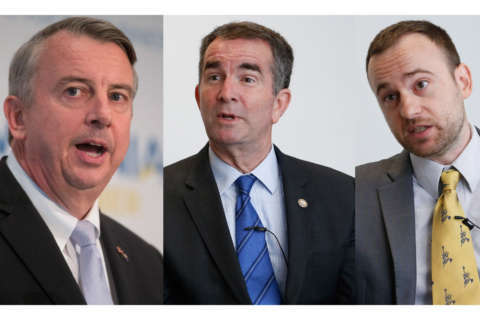
The state’s off-year general election comes just months into President Donald Trump’s presidency and the race, pitting two traditional Virginia candidates, is seen by some as an early referendum on Trump and a preview of next year’s congressional midterm elections.
Neither Republican Ed Gillespie nor Democrat Ralph Northam seem comfortable with the more extreme factions of their parties’ bases and have tried to walk a tight rope between more staid and congenial campaign tactics and the kind of fiery rhetoric that could drive voters to the polls in what is expected to be a lower-turnout election compared to last year’s presidential election. And the number of attack ads has grown rapidly as Election Day approaches.
Gillespie said he appreciates Trump’s support and that he’d be in a better position to work with the U.S. president if elected. But the former Republican National Committee chair turned lobbyist hasn’t campaigned with his party’s standard-bearer and has largely tried to steer clear of Trump and the president’s style of politics.
He’s stuck to bread-and-butter Republican issues: tax cuts, reducing regulations, enforcement of immigration laws.
Northam, a soft-spoken pediatric neurologist, has pledged to continue many of the policies of Gov. Terry McAuliffe, who is barred by term limits for running again. The state’s lieutenant governor pledged to support women’s access to abortion and birth control, gun control, and supports protections for immigrants and the LGBTQ community. But Northam has clashed with environmentalists who want him to oppose two planned natural gas pipelines that would run through the state.
Both campaigns suffer an enthusiasm gap with voters and they’ve relied on star power to help build excitement for the candidates.
Northam has campaigned with former Congresswoman Gabby Giffords, former Vice President Joe Biden and brought former President Barack Obama back into the “political spotlight” for an event in Richmond.
Gillespie campaigned with Vice President Mike Pence in southwest Virginia earlier this month and held a private fundraiser with former President George W. Bush. And more big names are heading to Virginia in the final days of the race.
Northam leads Gillespie in some polls, but generally, polling shows the two are running neck and neck.
Libertarian Cliff Hyra said he offers a third choice for voters who feel Gillespie and Northam are too polarizing.
“There’s a lot of good still that we can do by pushing the other candidates, I think, pulling them closer to the center, pushing them on some issues that they maybe don’t want to talk about,” Hyra said.
Ed Gillespie
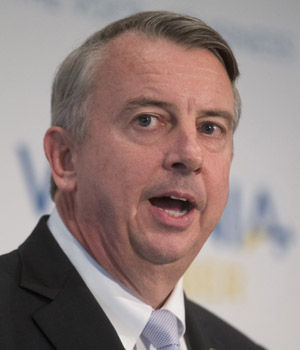
Brief bio: Republican Ed Gillespie previously served as chair of the Republican National Committee and was an adviser to former President George W. Bush. He made an unsuccessful bid for U.S. Senate in 2014, losing to Democrat Mark Warner, the incumbent and former governor.
Lives in: Fairfax County
Money raised: Brought in $4.4 million in September and had $2.5 million on hand heading into October, according to the most recent campaign finance filings.
Standing apart: Gillespie said that improving the state’s economy is his top priority.
“My policies will put us on the path to be No. 1 in the country in economic growth and job creation,” he said. Gillespie proposes cutting state income tax rates by 10 percent, which he said would invigorate the economy and ultimately put more tax revenue in the state treasury. He would phase in the cuts over three years. “We’ve got to do better in Virginia.”
Transportation and Metro: Gillespie wants to see the governance of Metro reformed and to control costs before he would consider dedicated funding to support the struggling transit agency.
He wants to protect money generated specifically for transportation so that it can’t be spent on other services. He also wants to prevent union wages from being imposed on public-private partnerships, which he said make such projects more expensive.
This summer, he criticized Northam for supporting a 2013 transportation funding bill, which Gillespie called a tax increase. He has since said that he would not roll back the law, which provided the first new funding for transportation in decades and was the crowning achievement of then-Gov. Bob McDonnell, a fellow Republican.
Restoration of rights: Gillespie said he wants the discretion to decide whether violent criminals deserve to have their civil rights restored. “People who’ve paid their debt to society and are living an honest life, we want to welcome back and restore their rights,” he told WTOP. “But for violent felons, people who are unreformed, unrepentant, violent criminals, that we need to have a more serious screening process and a vetting process before we restore those rights.”
He also would support legislation that would address the rights restoration of nonviolent felons, giving them the right to serve on a jury, be a notary public or vote.
Education: Gillespie wants to review the Standards of Learning testing process to make sure that the tests measure “the right thing at the right time.” He also wants to measure a student’s improvement. Gillespie has proposed education savings accounts that, similar to vouchers, would help students and their families pay for private education. Also, he would make it easier to create charter schools.
Ralph Northam
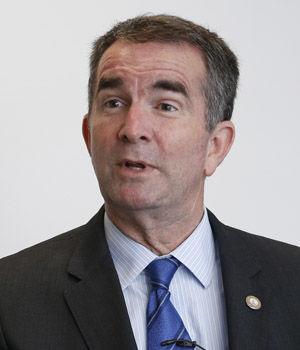
Brief bio: Democrat Ralph Northam is the state’s lieutenant governor. He previously served for six years in the Virginia Senate. As an Army doctor, he treated injured soldiers during Operation Desert Storm. He is a pediatric neurologist.
Lives in: Norfolk
Money raised: Brought in $7.2 million in September and had $5.7 million on hand heading into October, according to the most recent campaign finance report filed with the state.
Standing apart: Northam said he’s fighting for issues that Virginians care about: safe communities free from the threat of gun violence, good-paying jobs, a world-class education, access to affordable health care and clean air and water. He’s also focused on making Virginia an open and welcoming place. “We live in a very diverse society and that means that we need to be inclusive,” he told WTOP. “Our light will be on, our door is open,” he said.
Transportation and Metro: Northam supports dedicated funding for Metro, which he described as vitally important to the region’s economy and to the state’s. He said the state’s leaders need to work with officials in Maryland and D.C. to identify funding and then take a plan to Richmond to seek support among legislators. He has said that his experience in the Senate make him the best candidate to drum up support for Metro funding among lawmakers who have been reticent to support tax increases historically.
He supported the 2013 transportation funding bill that has generated $2.8 billion for roads and transit, money that Northam said is helping to widen Routes 28, 7 and 1 in Northern Virginia and paved the way for improvements along Interstates 66 and 95.
Restoration of rights: Northam said he would continue the practice of current Gov. Terry McAuliffe to restore the rights of felons as they complete their sentences, regardless of the crime. He supports making restoration automatic.
“We’re very proud we’ve restored the rights of over 156,000 Virginians,” he told WTOP. “We’re all human, and when someone makes a mistake and has paid back their time, the best thing that we can do to help them get back with their families, get back into the workforce, help with their self-esteem, is to restore their voting rights.”
Education: Northam has pledged to support traditional public schools and wants teachers to have a greater say in policies developed at the state level. He would make community college free for students preparing for certain in-demand fields and who agree to repay their education by working for the state, a nonprofit, or moving to an area where their skills are needed.
Cliff Hyra
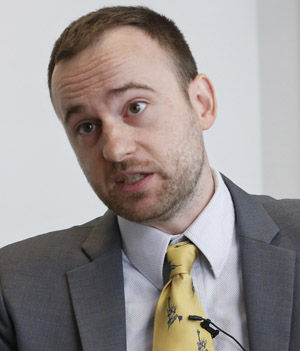
Brief bio: Libertarian Cliff Hyra grew up in Fairfax County and graduated from Virginia Tech and went on to earn his law degree at George Mason University. He is now a patent and trademark attorney and has never run for office before. He is married with four children.
Lives in: Mechanicsville
Money raised: Hyra had a little more than $4,000 on hand entering October, according to campaign finance reports filed this month. He raised more than $9,000 in September.
Standing apart: “The drug war needs to end,” Hyra told WTOP. His top campaign goals would be to reform a criminal justice system that he said is the “legacy of an overtly racist state government.” He said thousands of Virginians are arrested annually on drug charges — most related to marijuana, which he said the state should legalize.
Jailing people for such charges wastes taxpayer dollars, doesn’t provide the substance abuse treatment that many drug offenders need, and makes it harder for those offenders to find jobs when they leave prison. “We’re taking a public health issue and really trying to address it as a criminal justice issue, and it’s not working.”
He would also re-establish parole for nonviolent offenders, among other reforms.
Taxes: Those criminal justice reforms, Hyra said, would free up enough money to allow for significant income tax reductions. He would exempt the first $30,000 of income for individuals and $60,000 for households. Such a fundamental change in how Virginians are taxed could save the average family about $3,000 a year, he said.
Transportation and Metro: Hyra said he’d consider all options to help save Metro. But before he’d commit to new funding for the troubled transit agency, he’d want to see changes to the governance structure, the labor union structure, and would demand more cost savings. He suggests that any new funding be paid for by landowners along existing Metro routes.
Hyra said that public-private partnerships that helped pay for the 95 Express Lanes could be put to use in other parts of the state to relieve congestion
Restoration of Rights: Hyra would automatically restore voting rights after an offender had served their time. He would also pardon those who were serving sentences for drug use-related charges.
Education: Hyra supports the expansion of charter schools in the state. He said Virginia should follow models that have seen success in reducing achievement gaps in other states. He would also revise the Standards of Learning tests to instead measure a student’s progress from the beginning of the year to the end of the school year.

